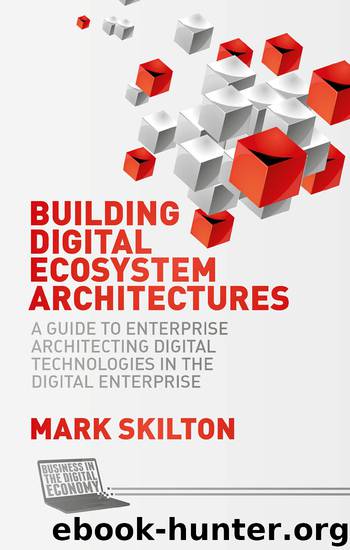Building Digital Ecosystem Architectures: A Guide to Enterprise Architecting Digital Technologies in the Digital Enterprise (Business in the Digital Economy) by Mark Skilton

Author:Mark Skilton [Skilton, Mark]
Language: eng
Format: azw3
ISBN: 9781137554116
Publisher: Palgrave Macmillan
Published: 2015-12-15T16:00:00+00:00
In Table 2.1 we see a cup of coffee, but a machine interface needs to understand and interpret this. Indeed, there have been great strides in image recognition, so much so that airports and search engines can scan images of human faces and complex objects to match patterns for recognition. Further information about objects can be gained by sensors. For example, embedded temperature sensors could enhance information about the object. A “smart cup,” for example, could have a built-in heat sensor and another sensor that could detect the liquid’s level in the cup. The temperature sensor could automatically detect the temperature and alert the user to its contents, saying “too hot” or “getting cold.” The liquid level sensor could order a refill or suggest a different beverage via a connection to a mobile app. Yet for all these advances in sensors, does this enable the semantics and pragmatics of the situation to be fully understood? Are all scenarios for a cup of coffee defined? Are all desired outcomes covered? As we can see, there are many potential outcomes, and it is for this reason that in the design and development of digital workspaces we are seeking to establish better outcomes from information at every level from the objects, content, status, relations to users, and environment. This is a recurring theme that is seen in many modern digital enterprise scenarios, where the issue of digital enablement has moved beyond syntax and basic semantic indexing to more advanced semantics and pragmatics in order to create what we describe as the contextualization of information; that is, information relevant and in context for the user’s situation and desired outcomes.
Contextualization
The process by which semantic meaning can be identified and imparted into the situation at hand
Download
This site does not store any files on its server. We only index and link to content provided by other sites. Please contact the content providers to delete copyright contents if any and email us, we'll remove relevant links or contents immediately.
Tools of Titans by Timothy Ferriss(8365)
Change Your Questions, Change Your Life by Marilee Adams(7759)
Deep Work by Cal Newport(7064)
Playing to Win_ How Strategy Really Works by A.G. Lafley & Roger L. Martin(6239)
Man-made Catastrophes and Risk Information Concealment by Dmitry Chernov & Didier Sornette(6005)
Big Magic: Creative Living Beyond Fear by Elizabeth Gilbert(5755)
Digital Minimalism by Cal Newport;(5749)
Ego Is the Enemy by Ryan Holiday(5414)
The Slight Edge by Jeff Olson(5410)
The Motivation Myth by Jeff Haden(5204)
The Laws of Human Nature by Robert Greene(5172)
Stone's Rules by Roger Stone(5081)
Tuesdays with Morrie by Mitch Albom(4770)
Eat That Frog! by Brian Tracy(4526)
Rising Strong by Brene Brown(4450)
Skin in the Game by Nassim Nicholas Taleb(4239)
The Money Culture by Michael Lewis(4198)
Bullshit Jobs by David Graeber(4179)
Skin in the Game: Hidden Asymmetries in Daily Life by Nassim Nicholas Taleb(3989)
